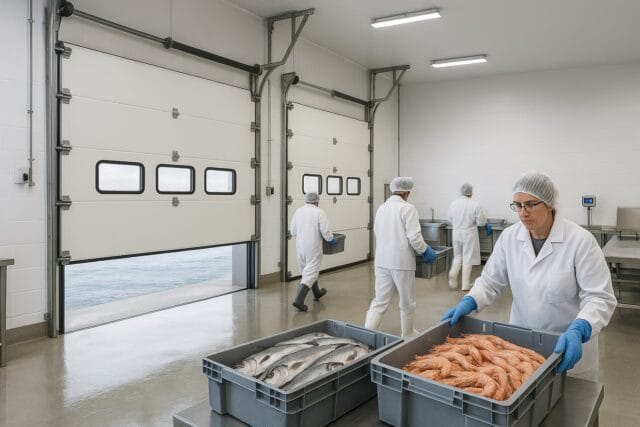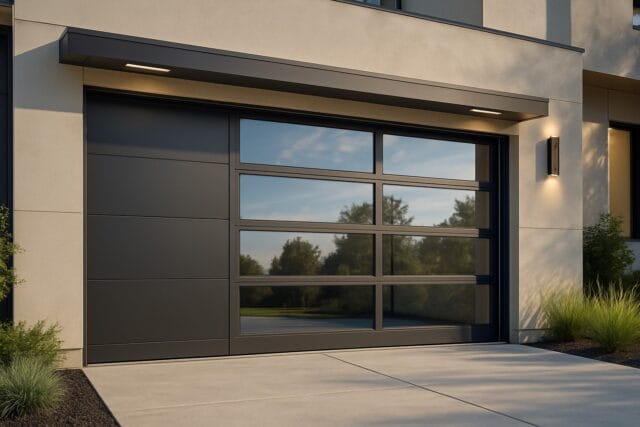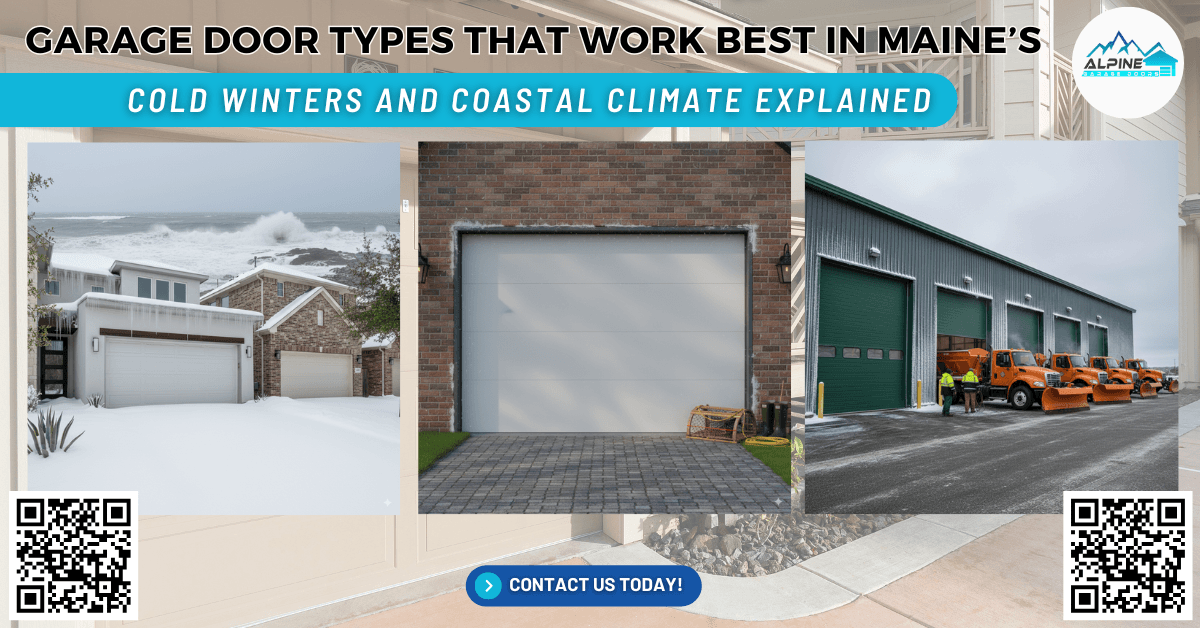Living in Maine presents homeowners and business owners with unique challenges when it comes to garage door performance and durability. From frigid winter lows to salty coastal air, the climate can wreak havoc on traditional garage doors if they are not built to withstand such extreme conditions. At Alpine Garage Doors New England, we recently worked with a homeowner in Bar Harbor whose wooden garage door swelled during winter storms and froze shut during snowfalls. The rollers would get stuck, and the openers failed repeatedly due to moisture damage. After assessing their needs, our team of certified master technicians replaced the system with modern garage doors, specifically an insulated steel door filled with polyurethane foam, featuring corrosion-resistant parts and heavy-duty tracks. Since then, the garage door has operated flawlessly throughout several snowstorms, providing not only peace of mind but also consistent protection against the elements.
According to the National Weather Service, parts of Maine regularly face temperatures as low as minus thirty degrees Fahrenheit, combined with persistent high winds and salt exposure near the coastline. These harsh weather elements can quickly lead to structural damage, rust, water infiltration, and mechanical failure in poorly constructed garage door systems. Choosing the right type of garage door, one designed for these specific conditions, is critical for ensuring the longevity of your system, protecting your home or business, and saving on costly repair services in the long run.
That is why our team at Alpine Garage Doors New England emphasizes modern garage doors that combine insulation, strength, energy efficiency, and weather resistance. Whether you live in the snowy inland areas of Bangor or the salt-sprayed harbor towns of Rockland and Bar Harbor, having a professionally installed, weather-rated door system is not just a luxury; it is a necessity for security, functionality, and peace of mind.
Understanding Maine’s Weather and Its Impact on Garage Doors
Subzero Winters and Heavy Snowfall
Maine experiences one of the longest and coldest winters in the continental United States. Snowfall totals frequently exceed seventy inches annually, especially in northern regions such as Caribou and Presque Isle. With freezing temperatures lingering for months, garage doors that lack proper insulation and sealing often become stiff, brittle, and inefficient. Older wood or aluminum garage doors may warp, while springs can become brittle and snap unexpectedly under pressure. Garage door repair becomes a frequent need during these months.
The practical implication for homeowners is that a garage door in this environment must act as a barrier against extreme temperatures and precipitation. Energy loss through poorly insulated doors leads to higher heating costs, and accumulated snow can obstruct door tracks and interfere with smooth operation. By selecting garage doors that feature high R-value insulation, reinforced steel tracks, and tight weather seals, homeowners can significantly enhance thermal efficiency and reduce wear on mechanical components.
For example, in Bangor, where winter temperatures often dip below zero, a steel garage door with polyurethane insulation and perimeter sealing can help maintain a temperature difference of up to 30 degrees between the outside and inside of the garage. This not only makes the space more usable but also protects stored items such as tools, vehicles, and electronics from freezing conditions.
Coastal Moisture and Salt Air
For properties located near Maine’s iconic coastline, including cities like Portland, Camden, and Bar Harbor, the presence of salt in the air is a constant concern. Salt accelerates the corrosion of metal components, including springs, hinges, tracks, and screws. In addition, the moisture carried by the ocean air can infiltrate door panels, causing materials to swell, rot, or develop mold over time.
The key to preventing these problems lies in material selection and proper installation. Fiberglass, vinyl, and stainless steel components offer excellent resistance to corrosion and moisture damage. Homeowners should also consider garage door systems that feature sealed seams, rust-resistant hardware, and specially coated panels to provide long-term durability.
For example, commercial garage doors used in seafood processing facilities near the coast must meet strict durability and hygiene standards. In these settings, fiberglass and high-density polyethylene doors are often preferred due to their non-porous nature and resistance to saltwater.

Wind and Storm Resistance
Maine frequently experiences intense storms known as Nor’easters. These storms bring high winds, sometimes exceeding sixty miles per hour, along with heavy precipitation and freezing conditions. An unreinforced garage door can become a weak point during such weather events, leading to door blowouts, broken panels, or even property damage.
To ensure security during high-wind events, modern commercial garage doors and residential garage doors often include internal steel reinforcements, impact-rated panels, and wind-resistant track systems. These features are standard in areas prone to extreme weather and offer both peace of mind and long-term savings in emergency repair services.
Additionally, many municipalities now require garage doors to meet specific wind load ratings. In Maine, especially in coastal regions, installing a door rated for at least 90 mph wind speeds is a wise choice. Reinforced horizontal struts and thick-gauge steel panels provide the structural integrity necessary to withstand high-pressure gusts without bending or collapsing.
Best Garage Door Materials for Maine’s Climate
Steel Garage Doors with Thermal Breaks
Steel is one of the most popular and reliable materials for garage doors due to its strength, availability, and affordability. For Maine’s climate, insulated steel garage doors with thermal breaks and corrosion-resistant finishes offer outstanding protection. Polyurethane-filled steel doors provide excellent R-values, sometimes reaching as high as R-18, which ensures energy efficiency even during the coldest winters.
Homeowners and business operators in areas such as Lewiston and Augusta frequently choose these doors for their all-around performance. When properly installed, a steel garage door with thermal breaks prevents condensation buildup between the interior and exterior metal layers, which is crucial in a state where freeze-thaw cycles are common.
Fiberglass Garage Doors
Fiberglass doors offer a great solution for coastal properties. They are highly resistant to salt air, humidity, and UV damage. Unlike wood, fiberglass does not absorb moisture, and it does not rust like untreated steel. Modern fiberglass garage doors come with layered construction and insulation, making them effective against Maine’s temperature fluctuations.
Their lightweight nature also makes them easier for automatic garage door openers to handle, reducing strain on the system and prolonging its lifespan. Fiberglass panels can also be finished in a variety of textures and colors, mimicking the appearance of wood while maintaining superior resistance to environmental challenges.
Vinyl Garage Doors
Vinyl garage doors are praised for their durability and low-maintenance features. Resistant to dents, scratches, rust, and pests, vinyl systems are often used in areas where long-term reliability and appearance are essential. While their insulation capabilities may not match those of high-end steel doors, insulated vinyl doors still perform well in moderately cold or humid conditions.
Another key benefit is that vinyl garage doors require virtually no repainting or refinishing. This makes them an ideal choice for rental properties or commercial garages where time and maintenance budgets are limited.
Wood Composite Garage Doors
For customers who desire the appearance of traditional wooden garage doors but want better performance, wood composite doors offer an ideal solution. These doors are constructed from engineered materials like recycled wood fibers and resins, providing the classic look of wood while offering increased resistance to moisture and temperature swings.
They are especially suited to older homes in historic districts, such as those in Kennebunkport, where maintaining a traditional aesthetic is important. Composite materials do not warp or crack like solid wood, and with modern insulation technology, they can achieve excellent thermal performance.
Insulation Types That Make a Difference
Polyurethane Insulation
Polyurethane insulation is considered the gold standard for garage doors in cold climates. It is injected into the panels in liquid form and expands to fill every space, resulting in dense, energy-efficient insulation. With R-values ranging from R-14 to R-18, polyurethane insulation is ideal for Maine’s harsh winters, where subzero temperatures can persist for extended periods.
This type of insulation not only retains heat but also improves the structural integrity of the door. Homeowners using their garage as a workshop, gym, or laundry space will benefit from the warmth and noise reduction that polyurethane provides. Commercial garage door systems in warehouses and industrial facilities often rely on this insulation type to prevent heat loss and reduce operational costs.
Polystyrene Insulation
Polystyrene insulation is a rigid foam board that is inserted between layers of the garage door. While not as dense or high-performing as polyurethane, it still offers significant thermal benefits at a lower cost. R-values typically range from R-6 to R-10, making it a viable option for homeowners who want an upgrade from non-insulated doors without the premium price tag.
Polystyrene is also known for its lightweight nature, making it easier to install and easier on door openers. It is frequently used in residential garage doors throughout central and southern Maine, where temperature extremes are somewhat milder.
Seals and Weatherstripping
Weatherproof seals are the unsung heroes of winter garage door systems. Without them, even the most insulated door cannot keep out wind, snow, or moisture. High-quality bottom seals prevent snow from seeping underneath the door. Side and top perimeter seals block drafts, rain, and pests from entering the garage space.
For coastal homes, seals must also be UV-resistant and non-permeable to salt air. Routine inspection and replacement of worn-out weatherstripping can make a major difference in comfort and energy savings. An often-overlooked tip is to install a threshold seal on the garage floor, which creates a raised barrier and further enhances protection.
Garage Door Styles That Handle Cold Winters
Raised Panel Garage Doors
Raised-panel garage doors are one of the most common and versatile designs. These doors work well in both residential and commercial applications, offering a classic look that suits many architectural styles. When constructed from insulated steel or fiberglass, they become a highly functional option for cold-weather regions.
This design also allows for easy customization. Homeowners can choose from different finishes, window inserts, and insulation levels. The raised panels add strength to the door, which helps during high winds and snowy conditions. Raised panel systems installed by a precision door service team will last many years with minimal maintenance.
Carriage House Garage Doors
Inspired by the look of barn doors, carriage house garage doors combine traditional charm with modern engineering. Available in a variety of materials, including steel, composite wood, and fiberglass, they are especially popular in Maine towns that embrace colonial or coastal aesthetics.
The strength of carriage-style doors lies in their layered construction. Behind the decorative overlay lies an insulated core that keeps out the cold and minimizes noise. When fitted with heavy-duty hinges and hardware, these doors handle harsh winters without sagging or splitting.
Modern Contemporary Garage Doors
Contemporary garage doors bring a sleek, modern look to homes and businesses alike. Popular features include clean lines, flush panels, aluminum frames, and tempered glass inserts. In the past, these styles were mainly aesthetic, but today they are engineered to meet rigorous insulation and wind resistance standards.

Double- or triple-paned insulated glass, thermally broken aluminum frames, and reinforced tracks make modern garage doors a practical choice even in Maine. Frosted or tinted glass provides privacy while maintaining a bright, open feel inside the garage. These doors are ideal for newer homes or businesses with minimalist design themes.
Custom Garage Doors
Every home and business is unique, and sometimes standard garage doors simply do not meet your specific needs. That is where custom garage doors shine. Whether you are dealing with an oversized opening, historic architectural requirements, or particular performance concerns, custom doors offer tailored solutions.
Alpine Garage Doors New England has helped clients design custom commercial garage doors for fire departments, industrial buildings, and residential properties that require exact specifications. From added security features and specialized openers to unique finishes and high wind ratings, custom garage doors ensure no compromise is made.
Critical Features for Winter-Ready Garage Doors
High R-Value Insulation
In Maine, insulation is not optional. It is essential. The higher the R-value, the more effective the door is at keeping the cold out and the warmth in. For the best performance, choose garage doors with R-values of 12 or higher. This is particularly important if your garage is attached to your home or used as a living space.
Stainless Steel and Galvanized Hardware
The hardware used in garage door systems is often exposed to moisture and fluctuating temperatures. Choosing components made of stainless steel or galvanized steel ensures long-term performance and resistance to rust. This is especially important for coastal and lakefront properties.
Full Perimeter Sealing
Complete sealing around the door helps reduce energy loss and prevents water, pests, and dirt from entering. When coupled with high-insulation panels, it creates a highly efficient barrier against the elements.
Wind Load Reinforcement
Wind-rated garage doors feature internal braces and thicker panels that are designed to hold up under pressure from strong winds. These systems are necessary in storm-prone areas like Maine, where Nor’easters can produce hurricane-force gusts.
Quiet and Reliable Openers
Modern garage door openers with belt drives and insulated motors are designed to operate smoothly and quietly. Battery backup options ensure that the door functions even when the power goes out during snowstorms, a common issue in rural Maine.
Maintenance Tips for Garage Doors in Maine
- Lubricate Moving Parts: Cold weather can cause metal to contract and seize up. Use a silicone-based lubricant on hinges, rollers, and tracks monthly.
- Inspect and Replace Seals: Check for any cracks or gaps in the weatherstripping around the door. Replace damaged seals before the winter season.
- Check for Rust and Corrosion: Examine all metal components for early signs of rust. Clean affected areas and apply anti-corrosion spray as needed.
- Remove Ice and Snow Accumulation: Do not allow snow to pile up against the garage door. This can cause sealing failure and put strain on the opening system.
- Schedule Annual Maintenance: Hire a certified technician for a yearly inspection and tune-up. This includes checking spring tension, cable alignment, and overall system performance.
Regional Considerations Across Maine
- Southern Maine (Saco, Biddeford): Opt for fiberglass or vinyl garage doors with high corrosion resistance. Install advanced sealing systems to combat salt spray.
- Central Maine (Augusta, Lewiston): Prioritize insulation and wind resistance. Choose steel garage doors with polyurethane cores and reinforced tracks.
- Northern Maine (Presque Isle, Fort Kent): Use the highest R-value doors available. Ensure openers are equipped with battery backups and cold-weather lubricants.
- Coastal Maine (Bar Harbor, Camden): Combine fiberglass doors with stainless steel hardware. Consider marine-grade finishes and weather sensors for added durability.
Final Thoughts
Choosing the right garage door for your Maine home or business is about more than looks. It is about functionality, security, and long-term value. With the state’s extreme weather patterns — from bitter cold winters to corrosive coastal air — making the wrong decision could mean frequent repairs, energy loss, or premature replacement.
Modern garage doors designed with today’s technologies offer exceptional protection, style, and energy savings. By understanding your region’s specific challenges and investing in professional installation, you can ensure that your garage door system performs reliably for years to come.
Whether you are looking to upgrade your residential garage, install new commercial doors, or simply need repair and maintenance services, Alpine Garage Doors New England has the tools, expertise, and experience to help.
How Can Alpine Garage Doors New England Help You?
At Alpine Garage Doors New England, our mission is to provide homeowners and businesses with garage door solutions that stand up to Maine’s toughest weather. With decades of combined experience, our certified master technicians know exactly how to install and maintain systems that last.
We proudly offer:
- Free in-home consultations and professional recommendations
- Custom garage door design and full installation services
- Residential garage doors and commercial garage door systems
- Emergency garage door repair and replacement parts
- Preventative maintenance plans for year-round performance
- Smart openers, battery backups, and security enhancements
Our location at 150 Cross St, Boston, MA 02109, places us at the heart of New England service. Call us today at (617)-865-7222 to schedule your appointment. Let Alpine Garage Doors New England be your trusted partner in keeping your garage secure, functional, and weather-resistant every season of the year.
Frequently Asked Questions (FAQs)
- How long do garage doors typically last in cold climates like Maine?
Garage doors in Maine can last 15 to 30 years, depending on the material, maintenance routine, and exposure to elements. Regular servicing and the use of rust-resistant components help extend the lifespan significantly.
- Is it worth insulating a detached garage in Maine?
Yes, insulating a detached garage is beneficial, especially during harsh winters. It protects stored items from freezing and reduces strain on vehicles and equipment by maintaining a more stable indoor temperature.
- Can a garage door opener freeze or stop working in winter?
Yes, garage door openers can freeze or malfunction due to ice buildup, low temperatures, or moisture affecting internal electronics. Choosing openers rated for cold climates and ensuring regular lubrication and weather sealing helps prevent this.
- What is the best time of year to install a new garage door in Maine?
Fall is often the best time to install a garage door in Maine, as it prepares your home or business for winter while avoiding the complications of snow, ice, and freezing conditions. Scheduling during off-peak months may also result in faster service availability.

